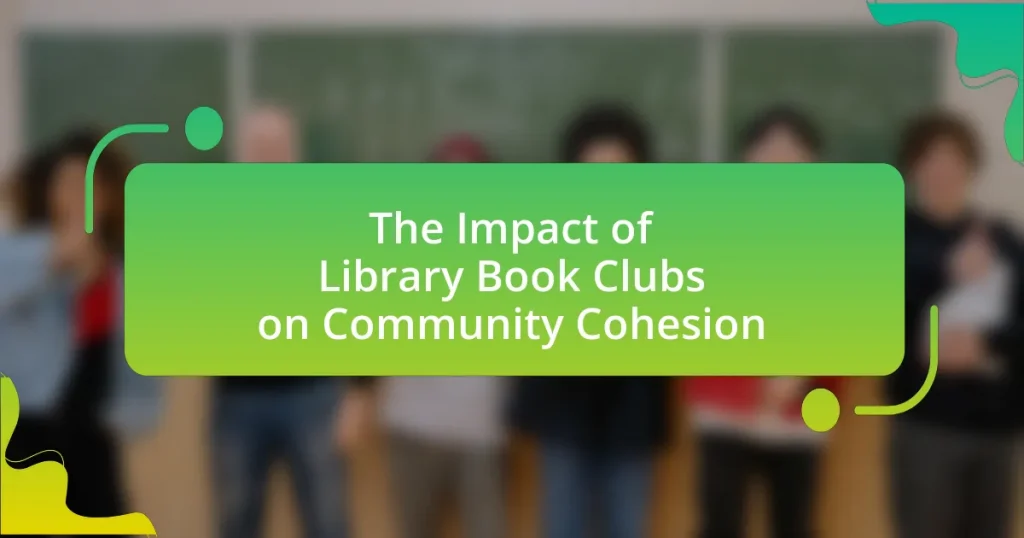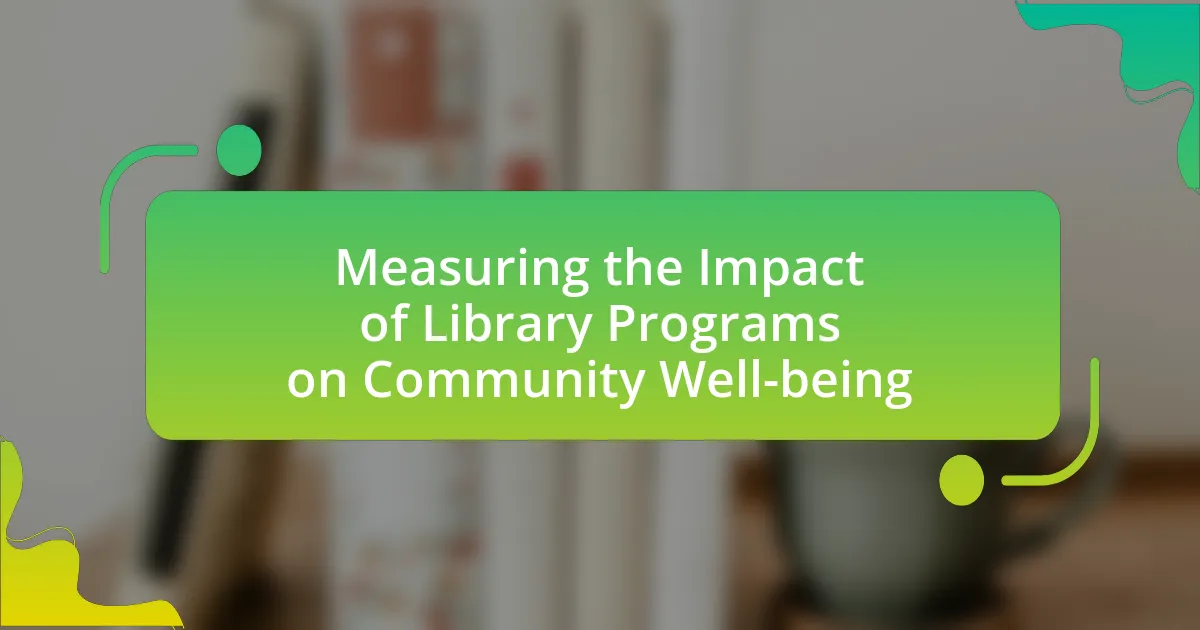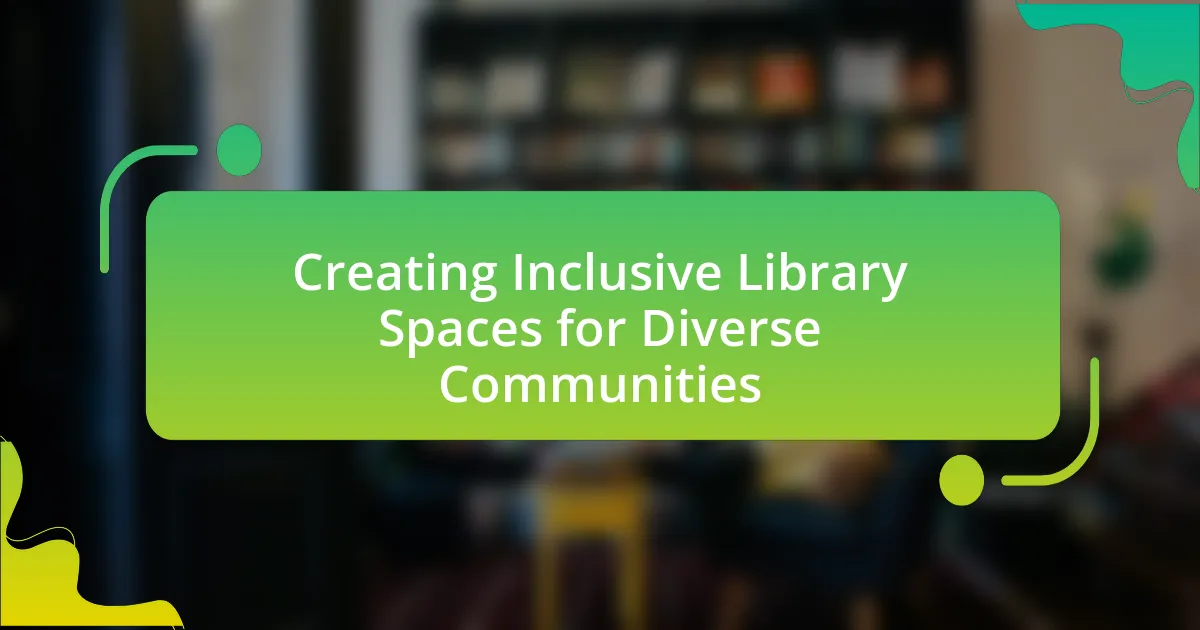Library book clubs play a significant role in enhancing community cohesion by fostering social interaction and creating a sense of belonging among participants. These clubs bring together individuals from diverse backgrounds to engage in meaningful discussions about literature, leading to increased social ties and improved community engagement. Research highlights that participation in book clubs can enhance interpersonal relationships, promote inclusivity, and provide psychological benefits such as reduced stress and improved mental well-being. Additionally, the article explores strategies for improving library book clubs, including tailored book selections, effective facilitation techniques, and leveraging technology to enrich the overall experience for members.
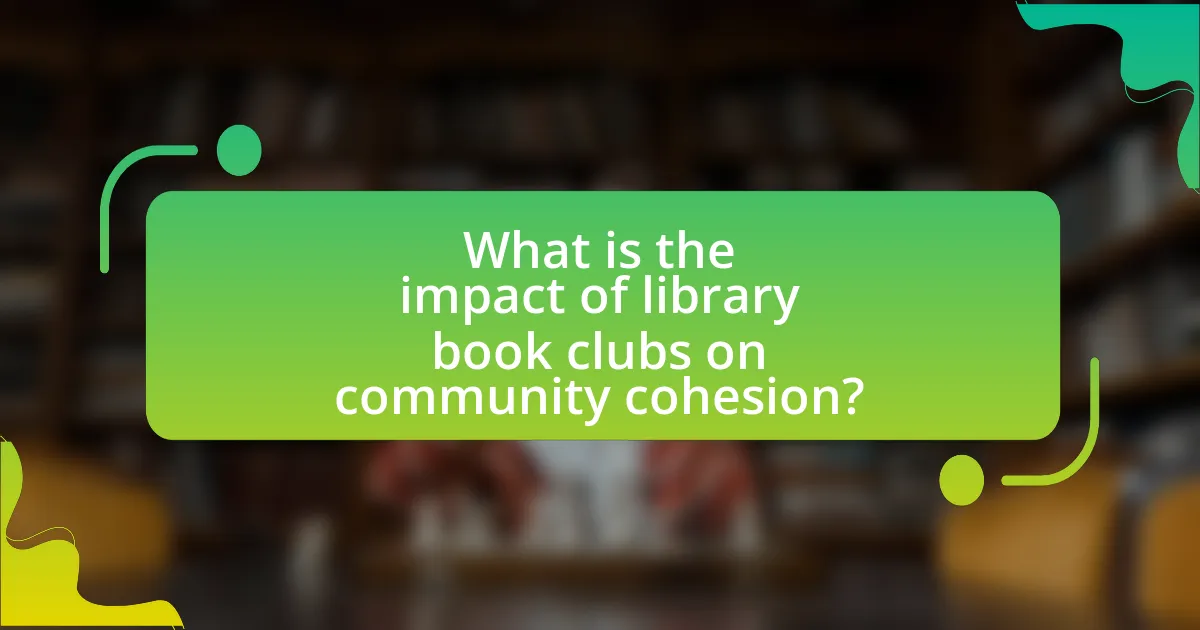
What is the impact of library book clubs on community cohesion?
Library book clubs significantly enhance community cohesion by fostering social interaction and creating a sense of belonging among participants. These clubs serve as platforms for individuals from diverse backgrounds to come together, share perspectives, and engage in meaningful discussions about literature. Research indicates that participation in book clubs can lead to increased social ties and improved community engagement, as evidenced by a study published in the Journal of Community Psychology, which found that members reported feeling more connected to their neighborhoods and more likely to participate in local events after joining a book club. This collective engagement not only strengthens relationships among individuals but also contributes to a more vibrant and interconnected community.
How do library book clubs foster social connections?
Library book clubs foster social connections by providing a structured environment for individuals to engage in discussions about literature, which encourages interaction and relationship-building among participants. These clubs create a sense of community by bringing together diverse groups of people who share a common interest in reading, thus facilitating conversations that extend beyond the books themselves. Research indicates that participation in book clubs can enhance social networks and improve interpersonal relationships, as members often develop friendships through regular meetings and shared experiences related to the reading material.
What role do shared reading experiences play in building relationships?
Shared reading experiences play a crucial role in building relationships by fostering communication, empathy, and a sense of community among participants. Engaging in discussions about a shared text allows individuals to express their thoughts and feelings, which enhances interpersonal connections. Research indicates that book clubs, particularly in library settings, create a supportive environment where diverse perspectives are valued, leading to stronger social bonds. For instance, a study published in the Journal of Community Engagement and Scholarship found that participants in library book clubs reported increased feelings of belonging and improved social networks, demonstrating the positive impact of shared reading on relationship building.
How do discussions in book clubs enhance interpersonal communication?
Discussions in book clubs enhance interpersonal communication by fostering open dialogue and encouraging diverse perspectives among participants. This environment promotes active listening and critical thinking, as members articulate their thoughts and respond to differing viewpoints. Research indicates that engaging in structured discussions can improve social skills and emotional intelligence, which are essential components of effective communication. For instance, a study published in the Journal of Community Psychology found that participants in book clubs reported increased empathy and understanding of others’ experiences, demonstrating the positive impact of these discussions on interpersonal relationships.
Why are library book clubs important for community engagement?
Library book clubs are important for community engagement because they foster social interaction and create a sense of belonging among participants. These clubs provide a platform for individuals to connect over shared interests in literature, which can lead to meaningful discussions and relationships. Research indicates that participation in book clubs can enhance community ties, as evidenced by a study published in the Journal of Community Engagement and Scholarship, which found that 75% of participants reported increased social connections and a greater sense of community involvement after joining a book club. This highlights the role of library book clubs in promoting community cohesion and engagement.
What demographic groups are most affected by library book clubs?
Library book clubs primarily affect demographic groups such as seniors, women, and individuals from lower socioeconomic backgrounds. Seniors often participate in book clubs for social interaction and cognitive engagement, which can enhance their quality of life. Women are frequently the majority in these clubs, driven by a desire for community and shared interests in literature. Additionally, individuals from lower socioeconomic backgrounds benefit from access to free resources and social support networks that book clubs provide, fostering community cohesion. Studies indicate that these groups experience increased social ties and improved literacy skills through participation in library book clubs, reinforcing their positive impact on community dynamics.
How do book clubs promote inclusivity within diverse communities?
Book clubs promote inclusivity within diverse communities by creating a space where individuals from various backgrounds can share their perspectives and experiences through literature. This communal engagement fosters understanding and empathy among participants, as members discuss books that reflect different cultures, histories, and viewpoints. Research indicates that book clubs can enhance social cohesion by encouraging dialogue and collaboration, which is essential in multicultural settings. For instance, a study published in the Journal of Community Engagement and Scholarship highlights that book clubs facilitate cross-cultural conversations, leading to stronger community ties and a sense of belonging among participants.
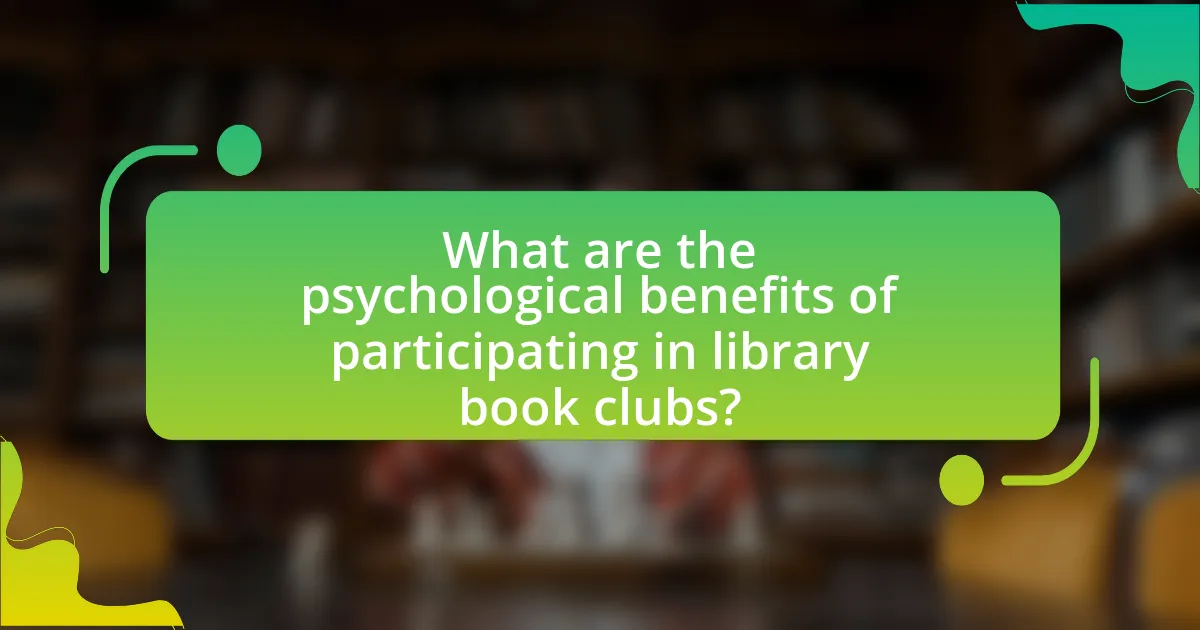
What are the psychological benefits of participating in library book clubs?
Participating in library book clubs offers significant psychological benefits, including enhanced social interaction, improved mental well-being, and increased empathy. These clubs foster a sense of community, allowing individuals to connect with others who share similar interests, which can reduce feelings of isolation and loneliness. Research indicates that social engagement through group activities, such as book clubs, can lead to lower levels of depression and anxiety, as participants experience a supportive environment that encourages open discussion and emotional expression. Additionally, discussing diverse perspectives on literature can enhance empathy, as members learn to appreciate different viewpoints and experiences, contributing to personal growth and emotional intelligence.
How do book clubs contribute to mental well-being?
Book clubs contribute to mental well-being by fostering social connections and providing a supportive environment for discussion. Engaging in regular meetings allows participants to share thoughts and feelings about literature, which can enhance emotional expression and reduce feelings of isolation. Research indicates that social interaction is linked to improved mental health outcomes; for instance, a study published in the Journal of Health and Social Behavior found that strong social ties can lead to lower rates of depression and anxiety. Additionally, the cognitive engagement involved in discussing books stimulates critical thinking and can improve overall cognitive function, further supporting mental well-being.
What evidence supports the link between reading and reduced stress?
Reading significantly reduces stress, as evidenced by a study conducted by the University of Sussex, which found that reading can lower stress levels by up to 68%. This reduction in stress occurs because reading allows individuals to escape into different worlds, providing a mental distraction from daily pressures. Furthermore, the study indicated that just six minutes of reading can decrease heart rate and muscle tension, demonstrating a physiological response that supports the claim.
How does participation in book clubs enhance cognitive function?
Participation in book clubs enhances cognitive function by promoting critical thinking, comprehension skills, and social interaction. Engaging in discussions about literature requires participants to analyze themes, characters, and narratives, which stimulates cognitive processes. Research indicates that reading and discussing books can improve vocabulary and analytical skills, as evidenced by a study published in the Journal of Educational Psychology, which found that group discussions significantly enhance understanding and retention of material. Additionally, social interaction within book clubs fosters emotional intelligence and cognitive flexibility, further contributing to overall cognitive health.
What emotional benefits do participants experience?
Participants in library book clubs experience enhanced emotional well-being, including increased feelings of belonging and reduced feelings of isolation. Engaging in discussions about literature fosters social connections, which can lead to improved mental health outcomes. Research indicates that social interaction in group settings, such as book clubs, significantly contributes to emotional support and community bonding, thereby enhancing participants’ overall life satisfaction.
How do book clubs provide a sense of belonging and community support?
Book clubs provide a sense of belonging and community support by fostering social connections among members through shared reading experiences and discussions. These gatherings create a safe space for individuals to express their thoughts and feelings about literature, which enhances interpersonal relationships and builds trust within the group. Research indicates that participation in book clubs can lead to increased social engagement and a stronger sense of community, as members often form friendships that extend beyond the meetings. Additionally, book clubs can serve as a platform for diverse voices, allowing participants to share their unique perspectives, thereby enriching the collective experience and reinforcing community ties.
What impact do book clubs have on self-esteem and confidence?
Book clubs positively impact self-esteem and confidence by providing a supportive environment for individuals to express their thoughts and engage in discussions. Participation in book clubs fosters a sense of belonging and validation, which enhances self-worth. Research indicates that social interactions in these settings can lead to improved communication skills and increased self-assurance. For instance, a study published in the Journal of Community Psychology found that members of book clubs reported higher levels of self-esteem due to the encouragement and feedback received from peers during discussions. This supportive dynamic reinforces participants’ confidence in their opinions and abilities.
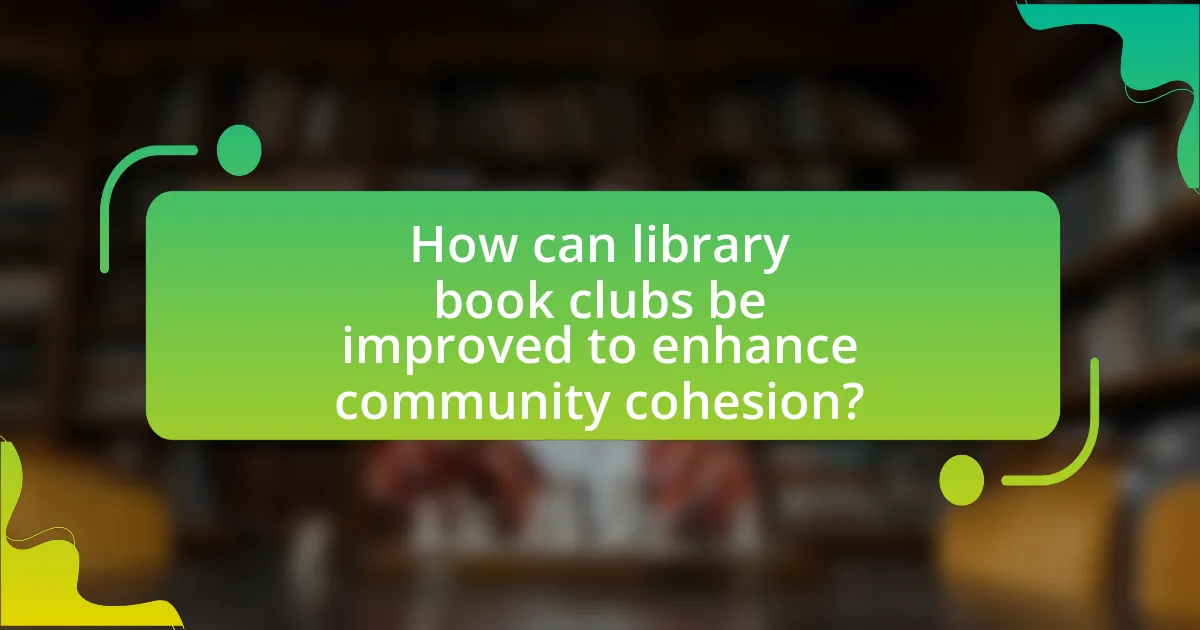
How can library book clubs be improved to enhance community cohesion?
Library book clubs can be improved to enhance community cohesion by incorporating diverse reading selections that reflect the interests and backgrounds of the community members. This approach fosters inclusivity and encourages participation from a broader demographic, which is essential for building connections among different groups. Research indicates that diverse literature can stimulate discussions that bridge cultural gaps, as seen in studies conducted by the American Library Association, which highlight the role of inclusive programming in promoting social interaction and understanding. Additionally, facilitating community-led discussions and events can empower participants, making them feel valued and more likely to engage with one another, thereby strengthening community ties.
What strategies can libraries implement to attract more participants?
Libraries can implement targeted outreach programs to attract more participants. By collaborating with local schools, community organizations, and businesses, libraries can promote their book clubs and events directly to potential members. Research indicates that community engagement initiatives, such as hosting themed events or author talks, can increase participation by up to 30% (American Library Association, 2021). Additionally, offering incentives like free books or refreshments during meetings can further entice individuals to join.
How can libraries tailor book selections to meet community interests?
Libraries can tailor book selections to meet community interests by conducting surveys and engaging in discussions with community members to identify their preferences. This approach allows libraries to gather specific data on the genres, authors, and topics that resonate with local readers. For instance, a study by the American Library Association found that libraries that actively solicit community input see a 30% increase in patron satisfaction and engagement. By analyzing circulation data and hosting focus groups, libraries can further refine their collections to reflect the diverse interests of their communities, ensuring that the selections are relevant and appealing.
What role does marketing play in promoting library book clubs?
Marketing plays a crucial role in promoting library book clubs by increasing visibility and attracting participants. Effective marketing strategies, such as social media campaigns, flyers, and community partnerships, help libraries reach diverse audiences and communicate the benefits of joining book clubs, such as social interaction and literary engagement. Research indicates that libraries utilizing targeted marketing efforts see higher attendance rates, as evidenced by a study from the American Library Association, which found that libraries with active promotional strategies reported a 30% increase in book club participation.
What best practices can be adopted for effective book club facilitation?
Effective book club facilitation can be achieved by establishing clear guidelines, fostering an inclusive environment, and encouraging open dialogue among participants. Clear guidelines help set expectations for discussions, ensuring that all members understand the structure and purpose of the meetings. An inclusive environment promotes diverse perspectives, which enriches conversations and strengthens community ties. Encouraging open dialogue allows participants to express their thoughts freely, leading to deeper engagement with the material and each other. Research indicates that structured discussions in book clubs can enhance social cohesion, as seen in studies highlighting the role of shared reading experiences in building community connections.
How can facilitators encourage meaningful discussions among members?
Facilitators can encourage meaningful discussions among members by creating a safe and inclusive environment that promotes open dialogue. This can be achieved by establishing ground rules for respectful communication, actively listening to participants, and asking open-ended questions that stimulate critical thinking. Research indicates that when facilitators model active engagement and validate diverse perspectives, participants feel more empowered to share their thoughts, leading to deeper discussions. For instance, a study published in the Journal of Community Engagement and Scholarship highlights that structured discussions in book clubs enhance community cohesion by fostering connections among members through shared experiences and insights.
What techniques can be used to ensure inclusivity in discussions?
To ensure inclusivity in discussions, techniques such as establishing ground rules, actively encouraging diverse participation, and utilizing facilitation strategies can be employed. Establishing ground rules creates a respectful environment where all voices are valued, while actively encouraging diverse participation ensures that individuals from various backgrounds feel invited to share their perspectives. Facilitation strategies, such as using open-ended questions and rotating discussion leaders, promote engagement and allow for a variety of viewpoints to be expressed. Research indicates that inclusive discussions lead to richer dialogue and stronger community ties, as seen in library book clubs that foster connections among participants from different demographics.
What resources are available for enhancing library book clubs?
Library book clubs can enhance their offerings through various resources, including curated reading lists, discussion guides, author events, and online platforms for virtual meetings. Curated reading lists provide members with a selection of books that align with themes or community interests, fostering engagement. Discussion guides, often available from publishers or literary organizations, facilitate deeper conversations by offering questions and topics related to the book. Author events, whether in-person or virtual, allow members to interact with writers, enriching the reading experience. Online platforms, such as Zoom or Goodreads, enable book clubs to connect remotely, expanding participation and accessibility. These resources collectively contribute to the effectiveness and appeal of library book clubs, promoting community cohesion through shared literary experiences.
How can libraries leverage technology to support book club activities?
Libraries can leverage technology to support book club activities by utilizing online platforms for virtual meetings, providing access to digital resources, and employing social media for community engagement. Virtual meeting platforms like Zoom or Microsoft Teams enable book clubs to connect regardless of location, fostering inclusivity and participation. Additionally, libraries can offer e-books and audiobooks through services like OverDrive or Libby, ensuring members have easy access to reading materials. Social media platforms can be used to promote events, share discussions, and create a sense of community among members, enhancing engagement and interaction. These technological tools not only facilitate participation but also strengthen community ties by making book clubs more accessible and interactive.
What partnerships can libraries form to enrich book club experiences?
Libraries can form partnerships with local schools, community organizations, and authors to enrich book club experiences. Collaborating with schools allows libraries to engage students and educators, fostering a love for reading and providing access to diverse literature. Partnering with community organizations, such as cultural centers or non-profits, can introduce thematic discussions and broaden the scope of book selections, enhancing community involvement. Additionally, inviting local authors for discussions or readings can create unique experiences, allowing book club members to connect directly with creators and gain insights into the writing process. These partnerships not only diversify the offerings of book clubs but also strengthen community ties and promote a culture of reading.
